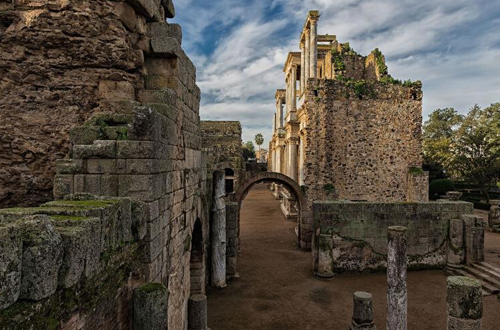In the first century AD,
公元一世纪
the Emperor Claudius would write a 20 volume history of the ancient Etruscans, which is sadly lost.
皇帝克劳迪斯写了20卷历史和伊特鲁利亚人有关,但是不幸遗失了
Although its loss probably reflects more its quality back in the day,
尽管这部书的遗失反映了当时书的质量
it would've been tremendously interesting,
但是这部书如果保留下来的话
had it survived, not only for our appreciations of the Etruscans,
应该是很有趣的不仅因为我们可以研究伊特鲁利亚人
but for our understanding of Claudius,
而且可以帮助我们了解克劳迪斯

who himself proudly traced his ancestry back to the Etruscan clan of the Clausii.
他很骄傲地把自己的血统追溯到伊特鲁利亚宗族
Four, the Roman national myth.
第四,罗马的神话
At the beginning of their history, the Romans
最初,毫无疑问
undoubtedly had to be simple,
罗马人都是很简单的
tough peasants with close ties to their native soil
坚韧的农民,和土地联系紧密
and steeped in the mos maiorum, the way of the elders.
按照祖先留下的方式进行生活
The Romans were always dropping the plow, and picking up the sword and then picking up,
罗马人总是放下犁,拿起剑
dropping the sword and picking up the plow,
然后放下剑,拾起犁
that sort of thing.
类似这样的活动
And most of all, they were farmers.
几乎所有的罗马人都是农民
To the end of the republican era,
在共和国末期
that is exactly how the Romans saw themselves,
这就是罗马人对自己的定位
long after they had become a primarily urban culture.
在经历了初步城镇文化后,对自己的看法
Of course, by that time, the Romans were also hideously wealthy
当然,那会罗马人都很富裕
and ruled the western Mediterranean.
统治了西地中海地区
Still, Rome's historians saw it
罗马的历史学家依然
as their task to preserve this aura of a simpler time,
认为自己有责任保留简单时代的氛围
the simpler time of the mos maiorum,
祖先生活的简单时代
whenever they wrote about Rome's earliest days.
无论他们怎么描述罗马早期的生活
Sometimes the tales they tell have little or no historical basis.
有时,他们讲述的故事几乎没有历史基础
Yet, they are very worthwhile for what they tell us about how the Romans saw themselves.
但是,这很值得花时间做,因为这就是罗马人对自身的看法
After all, it's not as though there's no such thing
毕竟,现在不存在
as an American national myth,
美国的民族神话
however differently you or I might personally interpret it.
供我们作出不同的解释












